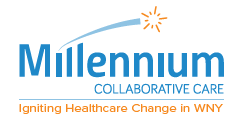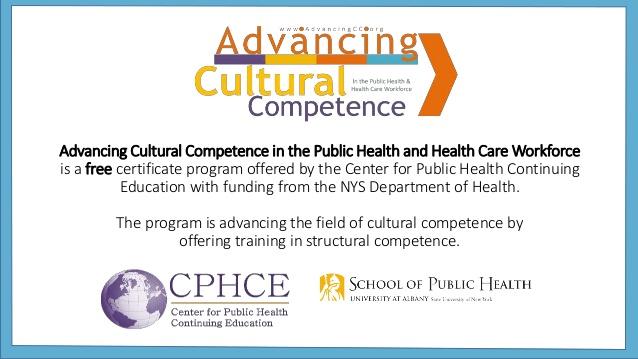University at Albany – School of Public Health: Advancing Cultural Competence in the Public Health & Health Care Workforce
This course is part of the Advancing Cultural Competence in the Public Health and Health Care Workforce curriculum, presented by the University at Albany School of Public Health. The course includes two one-hour recorded webinars, plus handouts, articles, and slides.
From Cultural Competency to Structural Competency: A Narrative Humility Approach
This one-hour webinar was originally presented on March 30, 2015, by Sayantani DasGupta, MD MPH, Assistant Clinical Professor of Pediatrics and core faculty member of the Program in Narrative Medicine at Columbia University.
This webinar begins within a discussion on how cultural competency has long been the educational mainstay in training health care workers to attend to the needs of diverse populations. This webinar expands the notion of cultural humility to suggest that all stories health care workers encounter have elements of the unknowable – and that all such stories must be approached from a stance of self-examination and narrative humility. This webinar also proposes that while it may not be reasonable or socially just to assume clinicians become ‘competent’ regarding any particular culture or cultures, however we must train ourselves to be competent regarding the structural issues of oppression, injustice and social violence that so deeply impact health care disparities across the spectrum.
The following continuing education credits are available for this webinar: CME (continuing medical education) credits, CNE (continuing nursing education) credits, CHES (continuing health education specialist) credits, CPH (public health) credits, and Social Work self-study continuing education credits. To obtain credits, complete the online evaluation form and post-test.
For more information about the Advancing Cultural Competence in the Public Health and Health Care Workforce curriculum, visit the Advancing Cultural Competence homepage.
Bridging Gaps: The Vital Role of Cultural Competence in Healthcare
This a one-hour webinar was originally presented on December 18, 2014, by Wilma Alvarado-Little, M.A., M.S.W., Language Access Advocate, and James O’Barr, M.S.W., Migrant Health Coordinator, N.E. Region, Hudson River Healthcare, Inc.
This webinar presents fundamental concepts on cultural and linguistic competence for medical and public health professionals. This webcast will demonstrate why cultural and linguistic competence is important and how it can facilitate dialogue, awareness, and learning to address diverse healthcare needs.
This webcast is part of the Advancing Cultural Competence Certificate program. More information can be found at www.advancingcc.org. Continuing education credits are no longer available for this course.
The Problem of Cultural Competency and How to Fix it
Structural Competency
From Cultural to Competency to Structural Competency
Bridging the Gap
After watching “From Cultural Competency to Structural Competency,” participants will:
- Recognize the pitfalls of a traditional cultural competency approach to health care education.
- Explain the potential benefits of a structural competency approach to health.
- Apply narrative techniques to identify their own frames of clinical listening.
- Identify community partners and resources to help connect their own clinical work with broader social justice advocacy.
After watching “Bridging Gaps,”participants will be able to:
- Recognize the benefits of culturally and linguistically appropriate health services.
- Describe methods for providing culturally and linguistically appropriate health services.
- Explain why providing culturally competent care is essential to improving overall individual and population-based health outcomes.


Comments